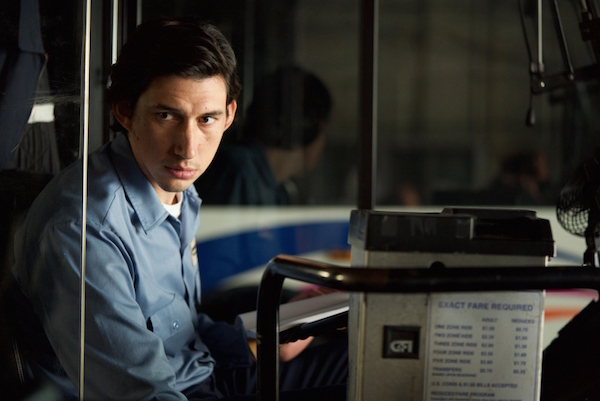Go see Paterson at the Grand Illusion this week
This post was originally published in January, but we're re-running it because Paterson is making a return engagement for one week only at the University District's wonderful Grand Illusion Cinema, starting tonight. Visit the Grand Illusion's site for screening times, and a little public service announcement: the Grand Illusion is cash-only, so hit up an ATM on the way. Also, in a total coincidence, today is Transit Driver Appreciation Day, so don't forget to thank a bus driver. Our favorite bus driver locally is Nathan Vass, who blogs about his experiences.

A lot of great movies adapted from written works have been released over the last month or so. Silence is a complex and challenging and ultimately rewarding adaptation of Shusaku Endo’s novel about the demands and responsibilities of faith. Fences is one of the most harrowing family dramas I’ve seen in years, with career-best performances from Denzel Washington and, especially, Viola Davis.
But one original movie in theaters right now, not adapted from a book or play, is a surprising tribute to the importance of the written word. I’m talking about Jim Jarmusch’s new film Paterson, and I’m telling you: if you love books and poetry and writing, you have to see this movie as soon as possible.
Paterson’s premise sounds like the setup for a limerick: Adam Driver stars as Paterson, a bus driver in Paterson, New Jersey. The film follows a week in his life, and not a whole lot, really, happens. Paterson is a man who likes his rituals: he walks the dog to the bar every night, and he writes a few lines of poetry into his notebook in the morning, and he likes to sit in the same spot and watch the water go over Paterson Falls. He and his girlfriend Laura (Golshifteh Farahani) live a quiet life that is mostly content. They could use a little more money, sure, but who couldn’t?
Paterson is a film of echoes. Certain themes repeat themselves over and over: fire, twins, rain. Paterson admires the poetry of William Carlos Williams, the city of Paterson’s most famous literary resident, and Williams’ work reverberates through the film as well. (Williams wrote an epic poem about the city also titled Paterson.) These little instances accrue into a fuller portrait, a pointillist masterpiece.
Paterson doesn’t write his poetry for the sake of immortality. He writes poetry because it’s how he processes the world. Driver reads the lines over and over in a halting voice as Paterson writes in his notebook and the handwritten words appear on screen. We see him sitting in his small office, lined with books by Williams and David Foster Wallace and Frank O’Hara, as he struggles to get the words just so. He seems to meet poets around every street corner: everyone is recording the universe in careful handwriting on lined paper in secret notebooks.
Paterson made me happier than any movie I’ve seen in recent memory. It’s a movie about art for the sake of art, a movie about writing and reading for no reason but for the pleasure of writing and reading. Paterson’s life inspires his art, which in turn inspires his life. There’s probably no big break around the corner for him. He’s probably not going to get a big thick hardcover anthology of his work. But he does it anyway, because he has to, and because it makes him better.
Trust me: you don’t want to half-watch Paterson on your couch while idly flicking through your phone. This is a movie to watch in the theater. Afterward, take public transit home. Bring a book of poetry to read on the bus or the train. Eavesdrop on some conversations. There’s art everywhere — you just have to be ready to receive it.